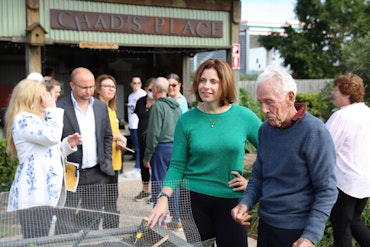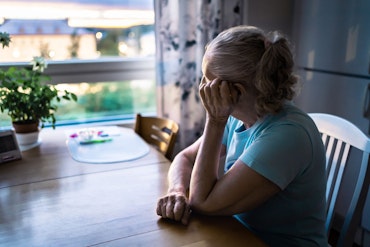Free education for older Victorians to recognise elder abuse in aged care
The ‘Know Your Aged Care Rights’ information sessions are targeted at older people seeking or receiving aged care services in their own home or in a residential aged care home

Person-centred care also focuses on caring, and promoting dignity, autonomy and respect for older people. (Source: Shutterstock)
Key points:
- Elder Rights Advocacy (ERA) is an organisation which stands up for older people, their family and representatives in Victoria
- According to estimates by the Royal Commission into Aged Care Quality and Safety, 39.2 percent of people living in Australian aged care facilities experience elder abuse in the form of neglect, emotional abuse or physical abuse
- It is thought that education on providing person-centred care may help prevent abuse
Elder Rights Advocacy (ERA) is offering free education seminars in Victoria, to better prepare professionals in the aged care industry. The programs are equipped to enhance the knowledge and skills, protect older people and respect their rights.
These sessions provide a range of information on topics related to advocacy and aged care, including:
- The Charter of Aged Care Rights
- The role of advocacy in supporting older people to access and interact with the aged care system
- How advocacy can support people who are unhappy with their aged care services
Topics such as understanding elder rights, upholding safety and preventing abuse or neglect are covered in the education course from ERA. Aged care professionals will also learn positive ways to communicate and engage with older people, fostering meaningful relationships and better meeting their individual needs.
According to Debra Nicholl, Chief Executive Officer (CEO) of ERA, service providers must embrace the chance to grow their awareness of human rights of older people.
“Arming service providers with information on the critical issues affecting residents’ lives including elder abuse, is the aim. We must continue to create an environment where family and staff are fully aware of the warning signs, especially regarding elder abuse. We must minimise risk as a priority,” she says.
“By empowering older people and aged care professionals with the knowledge and skills necessary to uphold elder rights, we are working towards a future where older adults receive the highest quality of care and support,” Ms Nicholl concludes.
Moyola Aged Care’s CEO Polly Devine says the need for ERA education came from a resident who had behavioural and psychological symptoms of dementia (BPSA) that created an uneasy rift between staff.
“The implementation of ERA education sessions has created a balance between the delivery of clinical care and promoting the dignity of choice at Moyola. ERA education around elder abuse is one of the most pertinent topics covered by the program. The ERA education on elder abuse has created positive reform at the industry and local level,” says Ms Devine.
“The discussions on how to recognise and report elder abuse is incremental in preventing further harm to older people, and the topic of confidentiality is particularly pertinent as it protects the complainant and promotes open disclosure between Moyola and its residents, staff and families,” she says.
Ms Devine adds that ERA education sessions focus on residents, which came to be a notable difference from other education programs Moyola has used.
“No other program is as committed to supporting and advocating for residents, especially those lacking insight into their rights and entitlements as people living in an aged care facility. At Moyola, upon completing the training, staff have reported feeling more empowered to report elder abuse and better equipped to recognise it.”
“Without this information provided by ERA, common place incidents that violate residents’ rights would go unnoticed. It’s so beneficial to providers because the program enables organisations to look inwards and identify how they can create incremental changes that break patterns of elder abuse,” concludes Ms Devine.
To learn more about your rights as a person entering into aged care, as someone in the industry or as a family member thinking about care plans — visit the ERA advocacy and education website.























Comments